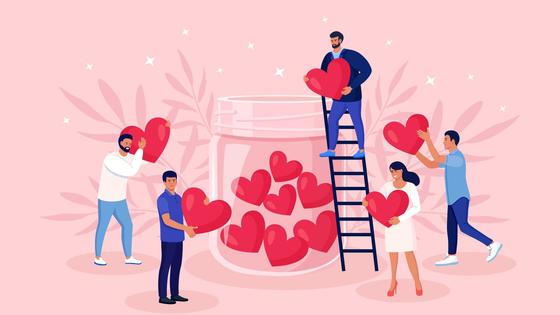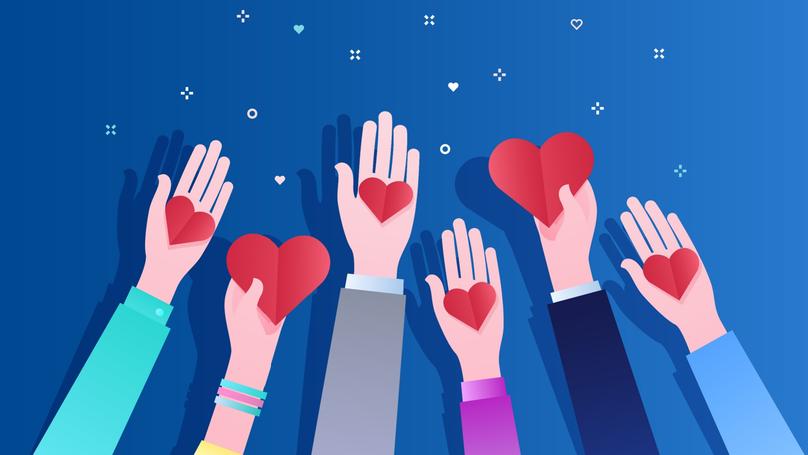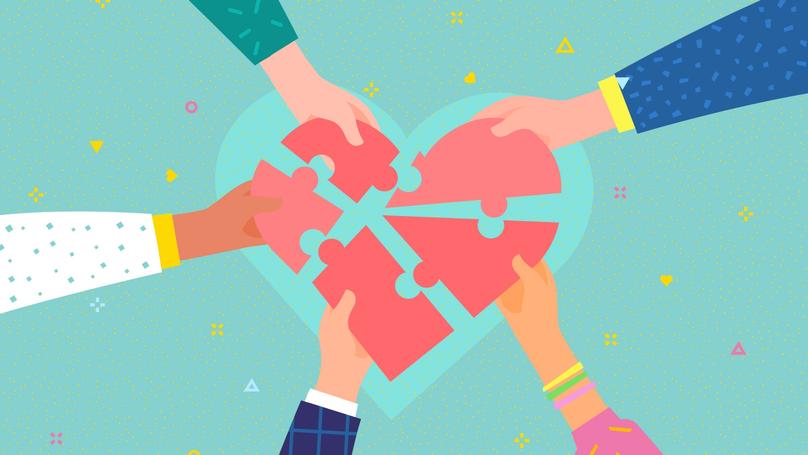Love is the best remedy: how tender affections affect mental and physical health
We usually associate the coming Valentine's Day with heartwarming gifts and cards, declarations of love, and romantic candlelit dates.

Nevertheless, loving someone and being loved is not only satisfying, but also good for your health. For several decades, scientists have been investigating the nature of love, studying the distinctive workings of the brain whenof people are in love. They are trying to find out whether love truly heals and prolongs life, if it can defeat fear and how else it changes the state of the body. In the meantime, we've found six major reasons that will convince you that it's absolutely life-saving to love!
Love contributes to the release of happiness and enjoyment hormones
The brain of a person experiencing romantic feelings for another person really starts to work differently. This is due to the fact that the body actively produces the hormone oxytocin, which is called the "love hormone". Such a spike in oxytocin generally occurs with physical contact, that is, hugging, kissing and simply touching. Oxytocin itself is produced in the hypothalamus, the part of the brain that is responsible for critical indicators such as body temperature, thirst and hunger, as well as maintaining balance in the body. But beyond that, it is oxytocin that helps us build and strengthen social bonds, such as parental attachment or romantic relationships between partners. The hormone reinforces these bonds, promoting intimacy and a sense of trust.
Vasopressin is another active agent that is produced during infatuation and is also labelled as the "hormone of commitment and fidelity". It provides stability and longevity of the relationship and comes into play later than oxytocin, when passion and desire are not as intense. It is thanks to vasopressin that strong relationships can be forged, because it stimulates the emergence of attachment both on an emotional, intellectual and spiritual level.
In addition, more of the "pleasure hormone", dopamine, is produced when you are in love. It makes you feel at ease, boosts your mood and even increases your self-esteem. And together, the active release of these hormones has a revitalising and rejuvenating effect on the whole system.
Love sharpens the mind
Expressions along the lines of "love makes you foolish and mad" are true to the contrary. Stephanie Cacioppo, a social neuroscientist and author of the book "Wired for Love", is convinced that love, especially mutual, sharpens the mind, improves social intelligence and creativity, and fosters artistic potential.
In addition, the already mentioned oxytocin enhances productivity and performance, as well as makes it easier to solve intellectual problems, generate innovative ideas and find the most unorthodox ways out of tight situations. It appears that people in love work more efficiently and approach any work creatively, feeling inspired and enjoying their own efforts.
Love alleviates stress and anxiety

When passion subsides, attraction grows into attachment, and infatuation transforms into conscious, mature love, the level of cortisol, that is, the stress hormone, also drops. A person in love begins to feel safe, secure and protected. Thus, the overall level of anxiety decreases, cortisol and adrenaline go down, and blood pressure becomes more normal.
In addition, the hormone serotonin is also produced, which helps to cope with emotional swings and stabilise one's mood. All this aids in calming down and creating an inner sense of comfort. Therefore, the mere presence of a loved one close by can work wonders - it becomes easier to cope with stress and feel relaxed. Even a call or a text message from a loved one, if they are not around, can help you regain balance and find peace.
Loneliness, on the contrary, only fuels agitation and anxiety, which triggers the release of adrenaline. As a result, the body experiences additional and completely unnecessary stress, and the person starts to feel unsettled and uneasy for no good reason.
Love lessens physical pain
Feeling love for another can actually increase tolerance to physical pain. A few years ago, scientists researching the influence of love on various body functions conducted an experiment. Volunteers were deliberately subjected to heat - a hot device was placed on their forearms, the temperature of which was between 43 and 47 °C. All those who took part in it, assured the scientists that the pain was significantly less when the beloved person held their hand.
Researchers suggest that the brain activity of two people in love synchronises when they touch. In other words, we feel as if we are understood and share the sensations we are experiencing. This activates the brain's reward or incentive systems, which dulls physical pain. But scientists are still carrying out research to figure out exactly how these mechanisms work.
For example, another experiment studied people's pain threshold and artificially created increasing pressure with the help of a special device. Volunteers were first alone, and then their partners were allowed to be present during the procedure. It is worth noting that they did not interact physically, either by touching each other, talking to each other or otherwise supporting their partner. Nevertheless, the study showed that even the mere presence of a loved one nearby reduced pain sensitivity in both men and women.
Love even facilitates recovery and wound healing. This was found out by clinical psychologist and professor of medicine Janice Kiecolt-Glaser. She conducted the following experiment: she made small cuts on the hands of several couples, then she asked some of them to talk to each other, showing care and tenderness, while the other couples were asked to recall a recent conflict. Interestingly, those couples who communicated with love healed much faster.
Love makes you live longer

According to numerous studies, married couples actually have a longer life expectancy than single people. This is called the protective effect of marriage. It is believed that being in love prolongs life by an average of five years.
This is largely due to the constant emotional support and care of the partner, as well as a more stable financial and social standing. In addition, married couples are more likely to lead an active healthy lifestyle, eat well, abuse alcohol and drugs less often, strive to get rid of bad habits, and not neglect to seek medical care. Spouses do not suffer from depression as often as their single peers, as these types of mental disorders are mostly found in those who live in social isolation. Similarly, people who are happily married have lower blood pressure and stronger immune systems. This is partly because kissing activates neuropeptides that regulate metabolism. They also boost the immune system, improve memory and help normalise sleep, and reduce the risk of developing all kinds of addictions.
However, even those who are not in a romantic relationship can increase their life expectancy by maintaining close relationships with family and friends. Any social contact with loved ones has a positive effect on health.
Lectera’s Online Courses by topic
Love motivates to lead a healthy lifestyle and take care of oneself
As a matter of fact, many people do not pay enough attention to their own health and even if they are concerned about something, they do not hurry to seek qualified help. In couples, however, it is more common for one partner to encourage the other to visit doctors, undergo check-ups and monitor their health, even if the other partner is not ready to do so.
This is why spouses are more likely to discover suspicious skin growths such as moles, bruises, or spotting on their partners. In addition, your partner may notice signs of allergies and even chronic diseases before the person suffering from those particular symptoms realises it. It is also believed that men who are happily married are less likely to get tonsillitis and have heart attacks than same-aged but single men who are not in a romantic relationship. And in general, strong romantic emotions strengthen the immune system, have a positive effect on the intestinal microflora and can improve digestion.
There's a reason why love is called one of the most complex and multifaceted feelings we are capable of experiencing. No wonder it has such a strong influence on all the systems of the human body. Thus, we have found out that love can heal both body and soul of those in love, reduce their pain, sharpen the mind and prolong life. So pay more attention to the experienced emotions and emerging romantic feelings, treat them with awe and care. Especially on Valentine's Day! Spend the holiday mindfully, think about how you can enrich your love to improve your own and your partner's health.
Share this with your friends via:
Latest News

In the UK, £23 million has been allocated for the expansion of the EdTech Testbed program — pilots of educational technologies in schools and colleges.

In the US, Tuskegee University announced the launch of Tuskegee University Global Campus (TUGC) — a new online platform for distance learning.

A significant stage in the development of the alternative education system has begun in West Northamptonshire in the UK: the County Council is actively calling on parents, guardians, and trustees to participate in shaping the future of this key area.

Outwoods Primary School in Atherstone, Warwickshire, having experienced deep sadness after the loss of their famous cat, Silla, has found solace in a new pet – a Maine Coon named Aloysius O’Hara.

In modern universities, artificial intelligence, and in particular ChatGPT, is rapidly transforming from a controversial tool into a full-fledged student assistant.












 9 Career Mistakes Young Professionals Make
9 Career Mistakes Young Professionals Make
 £23 million allocated for the expansion of EdTech Testbed in the UK
£23 million allocated for the expansion of EdTech Testbed in the UK
 Tuskegee University launches Global Campus — a new online platform
Tuskegee University launches Global Campus — a new online platform
 Test: How Psychologically Mature Are You? Check Your Inner Foundation.
Test: How Psychologically Mature Are You? Check Your Inner Foundation.
 Test. Check Your Social Media Dependency Level!
Test. Check Your Social Media Dependency Level!
 Test: What Business is Right For You?
Test: What Business is Right For You?
